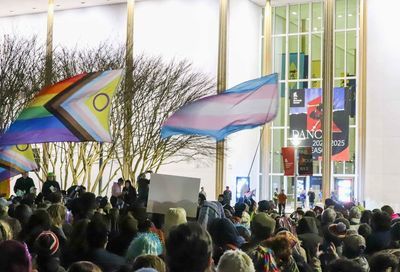Report Details Struggles Faced by LGBT Families, Recommends Paths Forward
On Friday, Jan. 27, a report co-authored by several national organizations will detail how, “[c]ontrary to stereotypes, children being raised by same-sex couples are twice as likely to live in poverty as those being raised by married heterosexual parents.”
 Jennifer Chrisler, the executive director of one of those organizations — the Family Equality Council — spoke with Metro Weekly about the report, “Strengthening Economic Security for Children Living in LGBT Families,” and its policy implications.
Jennifer Chrisler, the executive director of one of those organizations — the Family Equality Council — spoke with Metro Weekly about the report, “Strengthening Economic Security for Children Living in LGBT Families,” and its policy implications.
As to why the report — co-authored by FEC, the Center for American Progress and Movement Advancement Project — matters, Chrisler said, “I think it’s important for two reasons. The first is that there are 2 million children being raised by 1 million LGBT families in this country. Their economic security, their health and welfare, we think is a really important public policy issue.
“And the second is that, frankly, our community, and LGBT parents in particular, are more likely to be living near or at poverty, are more likely to suffer these economic challenges. All of that combined creates a really perilous situation for our families and their kids, especially in this moment, where the economy is sputtering and struggling.”
Asked what was the most surprising thing about the report, Chrisler was blunt: It’s about diversity.
“I think many people have a perception that LGBT people in general and that our families are middle class to upper-middle class, white and affluent. The reality is that our families are more racially and ethnically diverse than the population as a whole,” she said. “Same-sex couples of color raising children are more likely to be poor and there are more LGBT people of color, proportionally, raising kids than Caucasian couples raising kids.”
She believes the report can be used as a tool: “I think there’s a lot of really good education about how diverse the LGBT family community really is. It’s not the stereotypical image of two gay, white dads who have their kids through surrogacy and are living in the Upper West Side in New York. That’s not really who our families are.”
Chrisler added, “In fact, gay and lesbian couples are most likely to raise children in the South. They’re living in the states that are hardest to keep those families health and strong: the most stigma, the worst laws, the toughest environment.”
Among the report’s findings are the specific challenges faced by LGBT families, which Chrisler said included that “LGBT families pay higher taxes … and they’re often denied child tax credits” because of the Defense of Marriage Act’s prohibition on recognition of same-sex spouses as a married partner in federal law. The report lays out, in one chart, “How Means-Tested Safety Net Programs Treat LGBT Families Differently,” from Temporary Assistance for Needy Families (TANF) to public housing programs to Children’s Health Insurance Program (CHIP). Another section details the costs of legal protections that often need to be taken by LGBT families, including those costs relating to adoption and the drafting of powers of attorney documents.
Although Chrisler acknowledged that repeal of DOMA was unlikely in the current Congress, she did point to another bill, the Every Child Deserves a Family Act, as one piece of legislation “that could move forward in the congressional realm” — while noting that the bill’s aim also could be advanced “administratively and through appropriations work.” The bill, whose introduction was detailed earlier in Metro Weekly, aims to end discrimination in adoption and foster care based on sexual orientation, gender identity or marital status.
Of the administrative route, Chrisler said, “I think we are at a moment where we have an administration that is open to and willing to figure out how to strengthen LGBT families. And so, for the first time, we can go in and say, ‘Look, here’s the evidence you need to be able to make this case. Here are the concrete recommendations that we have that will make a positive change in the lives of families.’ And those two combined mean that we can get people to move and take action in a much more significant way.”
READ a copy of the final report: Strengthening-Economic-Security.pdf
Support Metro Weekly’s Journalism
These are challenging times for news organizations. And yet it’s crucial we stay active and provide vital resources and information to both our local readers and the world. So won’t you please take a moment and consider supporting Metro Weekly with a membership? For as little as $5 a month, you can help ensure Metro Weekly magazine and MetroWeekly.com remain free, viable resources as we provide the best, most diverse, culturally-resonant LGBTQ coverage in both the D.C. region and around the world. Memberships come with exclusive perks and discounts, your own personal digital delivery of each week’s magazine (and an archive), access to our Member's Lounge when it launches this fall, and exclusive members-only items like Metro Weekly Membership Mugs and Tote Bags! Check out all our membership levels here and please join us today!





















